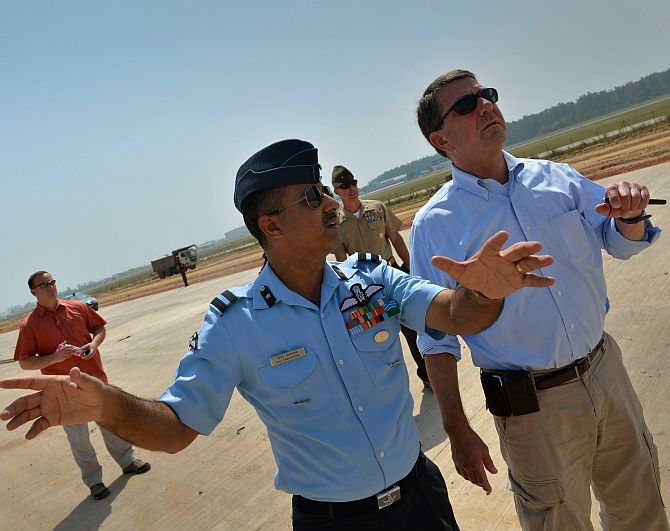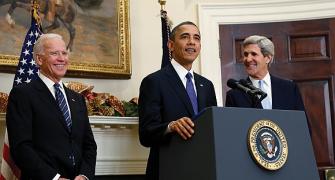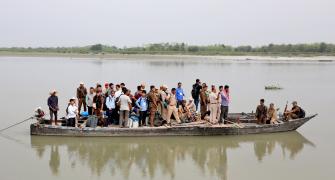
Photograph: Glenn Fawcett/US Department of Defence
'We have a common way of looking at the world, a common way of thinking, and a common set of values that predispose us to be partners. And our interests overlap greatly,' Dr Ashton B Carter, America's next defence secretary, told Aziz Haniffa/Rediff.com in an exclusive interview.
President Barack Obama nominated Dr Ashton B Carter as America's next defence secretary, the man who will replace Chuck Hagel when he is nominated by the United States Congress.
Dr Carter, who served as deputy defence secretary till he left the Obama administration, had been nominated by then defence secretary Leon Panetta as the point person to aggressively push US-India defence cooperation to unprecedented levels.
Over the course of his career in public service, Dr Carter has been awarded the US department of defence's Distinguished Service Medal four times. For his contributions to intelligence, he was also awarded the Defence Intelligence Medal.
April 2009 through October 2011, Dr Carter -- who earned bachelor's degrees in physics and in medieval history from Yale University and received his doctorate in theoretical physics from Oxford University where he was a Rhodes Scholar -- served as under secretary of defense for acquisition, technology and logistics.
He led the Pentagon's efforts to accelerate the fulfillment of urgent operational needs, increasing the defence department's buying power, and strengthening the nation's defences against emerging threats.
Dr Carter also served as chair, international and global affairs faculty at Harvard University's John F Kennedy School of Government, and co-director, Preventive Defence Project.
In the Clinton administration, Dr Carter was assistant secretary for defence for international security policy. From 1990 until 1993, he was director, Centre for Science and International Affairs, John F Kennedy School of Government at Harvard, and chairman, Editorial Board of International Security.
Dr Carter has co-edited and co-authored 11 books, besides writing articles, scientific publications, government studies, and Congressional testimonies.
In an exclusive interview with Aziz Haniffa/Rediff.com, first published on Rediff.com in January 2013, Dr Carter discussed US-India ties, Pakistan, China, and more.
For starters, what's your take on the most recent bilateral summit between President Barack Obama and Prime Minister Manmohan Singh, considering that India's economy has tanked with growth rates at an unprecedented low and the angst among US business and industry is palpable?
How much of a component was the defence relationship at this summit? Would you say it is now an integral part of the envisaged US-India strategic partnership?
The summit between President Obama and Prime Minister Singh clearly demonstrated the strength, breadth, and vitality of the India-US relationship. What we witnessed were the leaders of the world's two oldest and largest democracies affirming that the partnership between us has never been stronger, and pledging that the coming decade will be just as transformative as the last one in terms of deepening our ties.
When he addressed the Indian Parliament in 2010, President Obama famously called our relationship 'one of the defining partnerships of the 21st century.' Secretary of Defence (Chuck) Hagel and I could not agree more strongly with this sentiment. I am of the view that the United States and India are simply destined to be partners on the world stage.
We have a common way of looking at the world, a common way of thinking, and a common set of values that predispose us to be partners. And our interests overlap greatly.
As the deputy secretary of defence, I naturally focus on US-Indian defence cooperation, but our common interests also clearly align with respect to trade and investment, education, global health, energy and the environment, and a host of other areas.
Clearly, defence cooperation is an area in which we've come a remarkable way in a relatively short period of time. Today we hold regular senior defence consultations, we are major defence trade partners and major exercise partners, and we are each increasingly engaged in regional multilateral bodies such as the Association of Southeast Asian Nations. This is all very positive.

Image: Glenn Fawcett/US Department of Defence
The defence relationship has undeniably grown exponentially and both sides have pointed to it as being almost an anchor in the relationship. Especially now, when other sectors have proved to be disappointing, particularly since there seems to be a certain degree of policy paralysis in New Delhi and senior Indian officials keep counseling patience till after the elections.
In the wake of your recent visit to India and, of course, the Carter-Menon initiative (to push US-India defence ties), how would you assess the current state of US-India defence cooperation?
The president, Secretary Hagel and I all place great value on the multi-faceted defence relationship the United States enjoys with India.
The US government, to include the department of defence, is shifting an increasing amount of attention and resources to the Asia Pacific and Indian Ocean regions as part of what we call our 'rebalance.'
For the department of defence, this means that as we turn the corner from the wars in Iraq and Afghanistan, we are taking a number of steps to focus on the challenges and opportunities that are going to define our security future.
These steps include increasing our military presence in the Asia Pacific region, making investments in the types of military capabilities that are particularly applicable to the region, and expanding our security partnerships and alliances.
With respect to India, the rebalance is best measured by the investments we are making in terms of time and strategic attention, so that we can build on our already close ties. My recent trip was about taking these close ties to the next level.
This applies specifically to the Defence Trade and Technology Initiative, as well as to US-Indian defence cooperation more broadly.
And my overarching reaction to the discussions I had in New Delhi is that our defence relationship is strong, and getting stronger.
What do both sides need to do to grow this partnership beyond simply transport aircraft? When do you get into the real high-end stuff? True, C-17s from Boeing are wonderful and so are naval reconnaissance aircraft and the C-130 J Lockheed and the like, not to mention the jobs it creates in the US, but when can India be afforded access to the real stuff?
Are you committed to take it to the next level? And, in this regard, what can we expect that would manifest itself strategically? Will sensitive equipment be provided to India?
For example missile technology, sensing technology, drone technology -- the real stuff?
When former secretary of defence (Leon) Panetta and (then) Indian National Security Adviser (Shivshankar) Menon conceived of the DTI 15 months ago, they agreed that the effort should focus on streamlining and aligning our bureaucratic processes to make our defence trade more simple, responsive, and effective.
Our common goal was -- and remains -- to overcome process obstacles so that in the future our defence cooperation will be limited only by our respective strategic, independent decisions, and not by our respective bureaucracies and procedures.
As part of this effort, we have demonstrated repeatedly that we can release sensitive technology to India. I always say that the US export control system is one of the most important, serious, and really boring subjects out there.
But when you pay attention to the details, it is clear that we've adapted our system in ways that will speed our release process for India, subject to the knowledge that the process is subject to case-by-case review and there will always be some technologies that we will keep to ourselves. But this is true for all our partners.
Specific to India, what we have done is changed our mindset in the department of defense around technology transfer from a culture of 'presumptive no' to one of 'presumptive yes.' That's a significant change.
At the same time, we're reforming our export control regime more broadly, recognising that at times it can be overly restrictive. So now the US commerce department and the US state department grant India preferential categorisation under the US Strategic Trade Authorisation.
Under this authorisation, there are a small number of items that can only be exported without a licence to a select group of favoured nations, and we've added India to this select group.
We are also trying to find ways to make our licensing procedures more flexible.
So, we've developed innovative approaches -- we call them 'advisory opinions' -- that enable us to assess the likely level of technology we can release for a given case prior to a formal license request.
This allows the parties to a business deal an indication of whether the deal is going to go through or not. This is a great example of a creative approach.
Lastly, we are taking unprecedented steps to identify forward-leaning proposals from industry for defence items that the United States and India can co-produce and, in the true measure of our common goal, co-develop.
We've already put several promising proposals on the table. One of these is particularly groundbreaking, because it's an entirely new collaborative proposal to co-develop a next-generation Javelin antitank capability.
This proposal would address a key need for both our armies. And it's unprecedented because it's an offer that we've made unique to India. The Javelin proposal really embodies Secretary Hagel and my commitment to taking DTI to the next level.
And we're going to keep working at identifying new proposals. During my trip to Delhi I delivered a new round of potential areas of cooperation proposed to us by US industry. This sort of outreach to industry will continue, so that we continue to encourage US companies to join the DTI effort.
What would you say still remains to be done to achieve full potential?
Is there still a trust deficit when it comes to the perception in India, that when push comes to shove, the US may deny them sensitive equipment or exercise a veto over them?
There is also India's professed desire for strategic autonomy. How do you reconcile this with a full-throated defence partnership with strategic implications?
And, what would you say to cynics who might say going all out for such a partnership with India may ultimately not pan out, considering some of India's earlier reticence to be a strategic ally of the US?
US intentions are very clear. What we've seen over the last decade has been a rapid transformation of the US-Indian defence relationship. Today the United States is a major provider of some of the best equipment and technology that is enabling India's military modernisation.
Through DTI, we are working to move beyond simple sales -- mutually beneficial though they may be -- and toward a shared goal of increased co-development and co-production of systems.
We are incentivising our defence researchers to work together.
Senior leaders in our defence ministries are consulting on a wide range of regional security issues.
Our two militaries are training on land and at sea, so that we have exposure to one another's tactics, techniques and procedures.
I could go on, but the point is that we clearly want India to have all of the capabilities required to meet its security needs, and we want to be a key partner in that effort.
I would point to the Joint Declaration on Defense Cooperation that Prime Minister Singh and President Obama approved during their summit as a great indication of the level of commitment each government has demonstrated with regard to strengthening defence cooperation and engagement moving forward.
How does Washington reconcile such a full-throated strategic defence partnership with India, considering the paranoia in Islamabad? Or doesn't Islamabad not matter any more and talk of a strategic partnership with Pakistan is only window-dressing?
The United States continues to view Pakistan as a key country in ensuring future stability in South Asia. On my recent trip I had the opportunity to meet with members of the new government in Islamabad. The message I conveyed, which I also conveyed during my consultations with Indian leaders, is that Pakistan Prime Minister Nawaz Sharif is focusing on what we believe are his two highest priorities.
The first of these is that Pakistan's continued economic development is central to its security and to the security of the region, including India. And so the United States applauds steps Prime Minister Sharif has taken to revitalise Pakistan's economy.
Second, I was clear that the principal threat to Pakistan is terrorism, not its neighbours. I was honest with my hosts in Islamabad that the United States' view is that Pakistan must achieve peaceful relations with India if it is truly to develop its economy.
Pakistan must reap the benefits of cross-border trade, which is essential to economic growth. And it needs a secure and stable Afghanistan on its western side for the same reason.
I was equally frank with my counterparts in Delhi that the United States supports Pakistani efforts to improve their bilateral relations, and that we hope Delhi will reciprocate.

Image: Adnan Abidi/Reuters
How does the China factor play into all of this? Won't there be a degree of paranoia on the part of Beijing too, what with the talk of Asia pivot, Asian re-balancing, etc, which China may perceive as part of an encirclement strategy?
I'm asked this question all the time: 'Is our rebalance really all about China?' And the answer is no, it is not.
The rebalance is not aimed at anyone -- any individual country, or group of countries. What the rebalance is about is ensuring that the peace and stability that the Asia-Pacific has enjoyed for 60 years continues.
I always say that since World War II, a climate of peace and stability has prevailed in the Asia-Pacific region despite the fact that there has been no overarching security structure, like NATO (North Atlantic Treaty Organisation), to make sure that historical wounds were healed./p>
And during those years, first Japan and South Korea rose and prospered, and then many nations in Southeast Asia rose and prospered. And now, India and China are rising and prospering too.
The United States has welcomed all of this, but none of it was a foregone conclusion when you consider where Asia was at the end of World War II.
And while clearly the Asian political and economic miracle was realised, first and foremost, by the hard work and talent of the Asian people, it was enabled by the enduring principles that the United States has stood for in the region, and also by the pivotal role of American military power and presence.
Our partners in the region have welcomed our leadership and our robust engagement, and the values that underlie them.
Therefore, I believe that our rebalance will be welcomed and will be reciprocated. It is good for us, and it is good for everyone in the region.
And it includes everyone in the region, including China.
So as part of the rebalance we're committed to working closely with our Chinese counterparts and to maintaining a robust agenda of military-to-military engagements with them.






